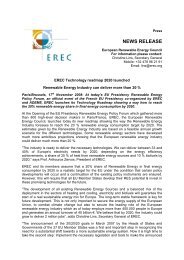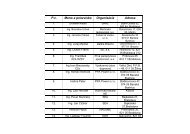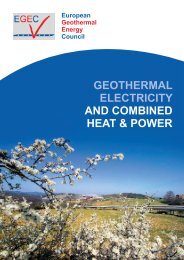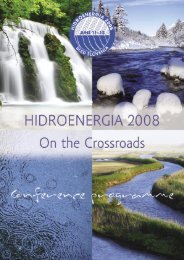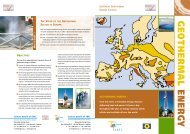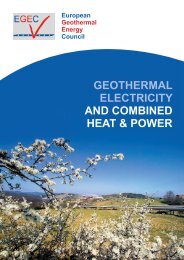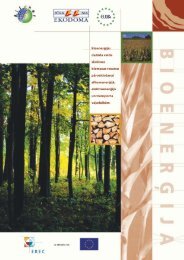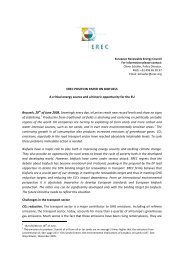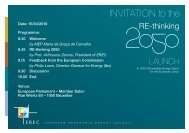CTO Assessment - European Commission
CTO Assessment - European Commission
CTO Assessment - European Commission
Create successful ePaper yourself
Turn your PDF publications into a flip-book with our unique Google optimized e-Paper software.
formance of Buildings, or newly designed<br />
support areas, such as the 6 th<br />
RTD Framework Programme’s CON-<br />
CERTO area and horizontal areas of<br />
the Intelligent Energy-Europe Programme,<br />
promote and support this integrated<br />
approach.<br />
The <strong>CTO</strong> has also shown that it is necessary<br />
to integrate all dimensions of<br />
renewable energy development (social,<br />
political, environmental, educational,<br />
and sectoral dimensions) in the<br />
framework of the different sustainable<br />
development options, and not only the<br />
purely technological or market ones.<br />
Developing the potential of renewable<br />
energy generation in urban environments<br />
Urban areas represent the largest<br />
group of energy consumers in Europe.<br />
Several large urban areas across<br />
Europe have demonstrated an outstanding<br />
level of excellence with regard<br />
to the integration of sustainable<br />
energy concepts, including renewable<br />
energies. It has been shown that improving<br />
living conditions, as well as<br />
qualification and regeneration of declining<br />
areas, are objectives linked<br />
to RES implementation, for instance<br />
in the framework of the development<br />
of Local Agendas 21. The discussion<br />
agreed that planning sustainable energy<br />
strategies with a short- mediumand<br />
long-term perspective is an urgent<br />
priority for decision makers, in<br />
order to provide clear signals to the<br />
private sector and those facilitating<br />
investment. Integrated concepts covering<br />
all main commodities, public<br />
services and building standards,<br />
which include energy efficiency and<br />
renewable energy equipment, were<br />
presented and strongly recommended<br />
by the City Authorities. Progressively,<br />
a new integrated conception of habitat<br />
prevails, where renewables play<br />
a new, fundamental role, always<br />
within the framework of the basic<br />
objective aiming to increase the welfare<br />
of <strong>European</strong> citizens.<br />
Improving the energy mix at local and<br />
regional level<br />
The close involvement of citizens in<br />
energy decisions and the creation of<br />
extensive partnerships between the<br />
different actors involved were demonstrated<br />
to be favourable conditions<br />
for RES especially at a local level.<br />
The decentralised nature of RES has<br />
been a precondition of success, bringing<br />
RES closer to the private sector<br />
and to the citizens. Experience has<br />
shown that RES can be instrumental<br />
in revitalising rural and industrial<br />
areas by creating new local markets,<br />
expertise and employment. Local<br />
policy can have a considerable impact<br />
in reducing CO 2<br />
emissions, if the<br />
objectives, the targets and the top<br />
down message are precisely formulated.<br />
The transfer of know-how between<br />
the regions, with specifically<br />
developed technology, will contribute<br />
to a balanced EU and Member States<br />
energy mix. The creation of Partnerships<br />
between the different actors and<br />
the <strong>European</strong> <strong>Commission</strong> has importantly<br />
contributed to stimulating the<br />
implementation of RES at local and<br />
regional levels. Outstanding examples<br />
of RES implementation in the regions<br />
needs now to become part of the<br />
“business as usual” activities across<br />
the EU, in an integrated concept<br />
aligned with measures towards a true<br />
intensification of energy efficiency.<br />
The panels acknowledged the continued<br />
necessity to tackle sustainable<br />
energy concepts directly in reach of<br />
the local communities and to foster<br />
exchange and knowledge transfer<br />
throughout Europe in a pro-active<br />
way.<br />
Paving the way towards 100% Renewable<br />
energy based communities<br />
An increasing number of communities<br />
in Europe head for a 100% renewable<br />
energy basis. Islands and<br />
remote rural communities have demonstrated<br />
throughout the campaign<br />
that they can be considered as high<br />
interest laboratories for all types of<br />
renewables. In these communities the<br />
renewables option was favoured due<br />
to the difficulty to get at conventional<br />
resources and their high supply costs,<br />
compared to their RES potential. It<br />
is in these areas where 100% RES<br />
initiatives had stronger development<br />
and true repercussion, decisively contributing<br />
to guarantee security of supply<br />
and protection of the environment,<br />
as well as economic welfare. One of<br />
the most relevant conclusions is that<br />
islands and isolated communities can<br />
and should turn themselves into exceptional<br />
showcases and demonstration<br />
centres of sustainable energy<br />
communities’ viability. Main success<br />
factors reported were leadership and<br />
clear policy frameworks. In particular,<br />
for islands and remote rural communities,<br />
utilisation of renewable energy<br />
sources and investing in best<br />
available energy efficiency technology.<br />
Campaign’s innovative features<br />
allowed the search of new market<br />
niches for RES development and contributed<br />
with an extensive ensemble<br />
of cases to the replication capacity of<br />
projects and initiatives, which has to<br />
be strengthened in the future. Today,<br />
the Campaign allows showing not<br />
only innovating solutions in the field<br />
of RES, but also their application to<br />
emerging sectors within industry, construction,<br />
transport, or other fields<br />
such as tourism, services, and water<br />
production. Likewise, its innovator<br />
spirit reached advanced and imaginative<br />
formulas of financing and management,<br />
which will help lifting still<br />
existing barriers to RES development.<br />
Future Community action is considered<br />
essential to fill gaps in level of<br />
awareness and to produce replication<br />
of best practices throughout Europe.<br />
Committing key stakeholders to the<br />
<strong>European</strong> Renewable Energy Targets<br />
One of the main vehicles of the <strong>CTO</strong><br />
to attract the commitment of key mar-<br />
Awareness Campaign<br />
41



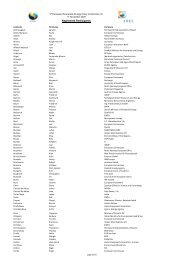
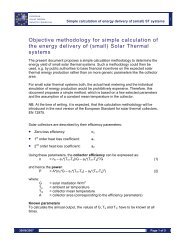
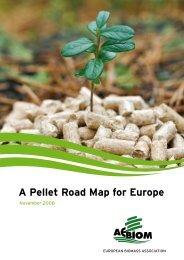
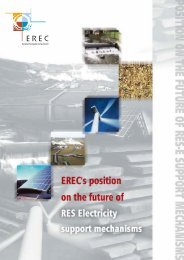
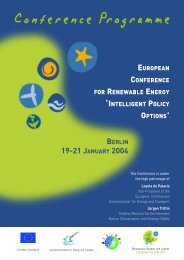
![Energy [R]evolution - Greenpeace](https://img.yumpu.com/47174859/1/184x260/energy-revolution-greenpeace.jpg?quality=85)
